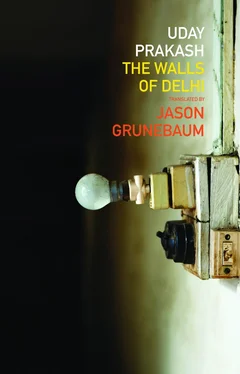It wasn’t easy, but Mohandas managed to sneak in through the gate and into the company compound. His jeans were torn at the knee, and were beginning to rip at the back, too, but Kasturi had patched those bits up with matching colours she’d used from scraps of fabric from a sari top or bedcover. Exposure to the elements and heat and cold and hunger and hard work had turned his skin a dark copper. Sorrow and calamity had scored his face with so many wrinkles that no one would ever believe he was younger than forty. Enduring want and quietly eating insult and injury had made the hair on his head and all over his body a little greyer. Mohandas was in his early thirties but looked as if he was in his fifties.
Mohandas stood in front of the same office where, four years ago, he’d brought his diploma and certificates, and where the employment clerk assured him that his name could never be crossed off the list since he’d had the highest marks for both the written and physical exams.
And sitting in the very same office was the very same clerk. He had a bigger chair now and a bigger desk in front of him to match; the air conditioner behind his desk provided him with a constant cool breeze. Mohandas stood in the doorway watching him busily eating tea biscuits and drinking chai, while two people sat in front of his desk chatting with him, as if they had all the time in the world.
At once the clerk noticed Mohandas, who quickly pressed his hands into a namaskar, and smiled a big smile with the hope that it’d jog the clerk’s memory. But the clerk looked put out — maybe he didn’t recognise Mohandas? He tried again, joined his hands again into a namaste and said brightly, ‘Sir, it’s Mohandas…!’ But by then the clerk had pressed the button beneath his desk that rang the bell. It had a hard clanging ring, and the underling appeared immediately. Mohandas couldn’t make out exactly what the clerk said to him, but they were clearly words of scolding. He emerged from the room, drew the curtain, and looked Mohandas over from head to toe with a scowl. ‘What business do you have here? Go sit on the bench outside. How the devil did you get in here?’ Mohandas wanted to tell the clerk that his name was Mohandas, and that four years ago he’d been offered a job here at the coal mine, and that all of his papers were sitting in that office, but then what happened was that some other man stole his name and stole the job… But Mohandas’s voice was too feeble, and the underling manhandled him over to the bench, and his utterances made no sense. There was a lump in his throat and he was stammering. Breaking free with one of his arms from the underling’s grip he managed to spit out, ‘ Dada, I need to see that clerk, just for a minute to pick up my papers and transcript.’
The underling more or less pushed him over onto the wooden bench that sat against the wall, turned around, and went back. Mohandas knew that he’d never be allowed back in; this was his last chance. He called after the man, who was just about to disappear inside the employment office.
‘Hey! HEY! Go tell that clerk that Mohandas, BA, is here, and he wants all the papers and certificates back he deposited here on 18 August 1997. What a bungle! Give you a nice room and big chair and then it’s nothing but anarchy? Grab a piece of paper, take down my name. Then go show it to your boss!’
The underling’s jaw dropped. Here was a guy dressed in rags who looked like a hobo, yet the language that came out of his mouth was quite lucid, even eloquent, and his manner equal to a educated manager, or clerk’s.
The man remained planted in the doorway and just stared at Mohandas: his washed-out, patched-up jeans; his mended, dirty checked shirt; his balding head, hair that’d turned half-grey; his lustreless, burnt-copper face, criss-crossed with crooked wrinkles; deep-set eyes, gloomy and weak, as if they were seeing a reflection of themselves; his cheap sandals stuck to his feet, their ancient rubber molested by penury and despair, now turned into dirt and wood and paper.
‘You son-of-a-bitch!’ the angry underling muttered under his breath. ‘You crazy bastard! Hey motherfucker, you think the big man will help your beggar butt?’
Mohandas surmised that the underling didn’t really believe what he was saying, even though god himself knew it was all true, so he stood up from the bench and walked toward the man with sure steps, maybe even with a little swagger. He had in mind that he would go in and try to explain that it wasn’t just that Bisnath had taken him for a ride, but had played the entire Oriental Coal Mines for a fool.
The way Mohandas was striding toward him, the impatience and swiftness, the taut wrinkles on his face that mirrored the distress in his mind, his deep-set eyes radiating an agitation, his dry, crusted, quivering lips, and the extreme upset in his words: the underling was scared out of his wits.
‘Whoa! Whoa! OK! One more step and you’re out the door! Stop right there, old man, stop, STOP!’
‘B-B-Buddy! Brother! Just hear me out…’ Mohandas said, a little on the loud side, trying to calm things down a little. But there was too much desperation and not enough supplication in his voice, and things got worse. The man straightened his back and screamed, ‘Get out! Stop right where you are or I’ll rip you a new hole, old man! One more step and out on your arse!’
Hearing the shouting and screaming, four or five guys emerged from the office. They were dressed like higher-ups, and gave Mohandas the hard once-over.
‘Who is this? How’d he get in here?’
‘Where’s security officer Pandey? He chews tobacco and sleeps on the job!’
‘Who’s on guard today at the main gate? Show me the log!’
‘Get him out of here!’
‘Isn’t this peachy? Any old fart could sneak in, take out a gun and start shooting — bang! bang! — and then what? Set off a bomb maybe!’
‘Hand ‘em over to the police! Sharmaji, call the police, dial 1-0-0 on your mobile!’
Nobody was listening to Mohandas; he was just being pushed around in a shower of slaps, fists, and elbows raining on his head, back, shoulders, and face. Mohandas covered his head with his hands to protect his eyes, ‘Please! Just hear me out, hey, stop hitting me, hey!’
Meanwhile, a small group of guards had come running. One was carrying a twelve gauge double-barrelled shotgun, the kind bank guards carry. The rest had batons. Shivers went up Mohandas’s spine; stars from the new moon night on the banks of the Kathina flashed before his eyes, the celestial bodies screaming and groaning, then falling like shooting stars, breaking into pieces. A hard blow struck him unannounced and he let out a scream that sounded like a bound pig getting its throat slit. The sound reached the coal miners, who came out and gathered to watch the show.
(Pay attention, this story takes place at the same time as when that all-seeing Hindi guru was doing you-know-what to a woman in his ascetic quarters, and, thousands of miles and a few oceans away, the US president was sitting in a chair in the White House doing the same thing. When latter-day sea pirates dragged a descendant of Gilgamesh out from a hole near the Tigris and Euphrates where he’d hidden for his life, shining a flashlight in his mouth, counting his teeth, looking for a cyanide pill.
It was the time when the amount of power someone had was, by the law of a kind of backward ratio, equalled by the same degree to which that person had become out of control, violent, barbarous, hellishly immoral. And the same force applied to states, political organisations, castes, religious organisations, and individuals.)
Mohandas stood outside the main gate of the Oriental Coal Mines in the middle of the road. He’d simply stopped thinking. A frightful near-silence buzzed all around. He didn’t realise he was standing in the middle of the street with trucks, Tempos, and cars honking their horns and whizzing by. He still had that thirty-rupee wallet in his pocket that he’d bought when he thought the job was his. In it was one hundred and seventy rupees, all from his labour and toil — this is what he had left, minus the sixty-five for his bus fare. Finding his wallet still there when he reached into his pocket, his mind eased a bit. He suddenly felt the sun’s heat and moved quickly to the side of the road. He was hungry.
Читать дальше










